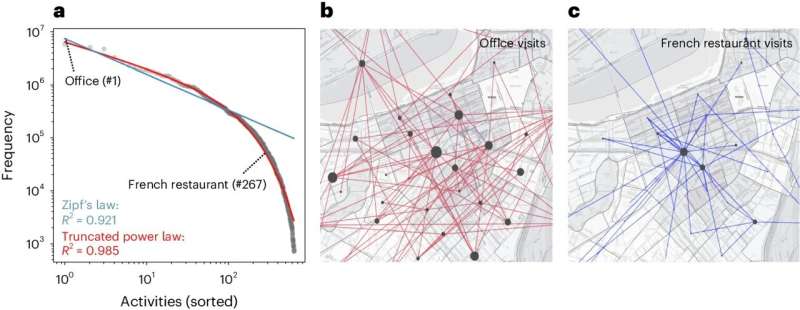
The next time you’re on a walk, consider stopping by that restaurant you’ve never been to or the local store you keep meaning to check out. They just might be the key to a vibrant local economy, according to a new study.
In a surprise finding based on anonymized cell phone mobility records, infrequent trips to places like restaurants and sports facilities—not the everyday office visit or school drop-off—accounted for the majority of differences in economic outcomes between neighborhoods.
The lesson for urban planners and individuals, researchers said, is to embrace the unusual.
“We should be more exploratory in our own lives and welcome those unexpected trips,” said Shenhao Wang, Ph.D., a professor of urban planning at the University of Florida who led the study.
The activities with the strongest predictive power included French and New American restaurants, golf courses, hockey rinks, soccer games, and bagel shops. These kinds of activities accounted for just 2% of trips but explained more than 50% of the variation in economic outcomes between neighborhoods. Wang and his collaborators didn’t initially expect these leisure activities to be so tied to local economic fortunes.
“Our findings also demonstrate impressive cross-city robustness,” said Yunhan Zheng, a doctoral student at the Massachusetts Institute of Technology and co-first author of the study. “The top 10 predictive activities are transferable across cities, explaining a large amount of the variation in economic outcomes across Boston, Chicago, Miami, Washington, D.C., Detroit, and Philadelphia.”
“Those irregular and infrequent activities are correlated with explorative behavior, the tendency of some groups to seek out opportunities, connect with different people, and create new businesses,” said Esteban Moro, Ph.D., a professor at Northeastern University, who co-led the study. “Looking at those infrequent activities, we are directly looking at current and potential economic opportunities in the future.”
Other activities, like participating in hobby sports, reflect greater risk-seeking behavior. “This leads to more socioeconomic exploration, like building businesses or developing social capital by connecting to more people,” Wang said. “Such people are more likely to conduct more diverse economic activities,” which is associated with better economic outcomes.
What was most surprising was that trips to the office—where we earn our money—were not strongly associated with income or property values. Rather, it’s how we spend our free time that drives the economic vibrancy of cities.
The study was based on over half a million anonymized cell phone mobility records in Chicago, Boston, and Miami. Using machine learning, Wang and his colleagues analyzed hundreds of unique activities and their ability to explain income and property value differences between census tracts.
The work is published in the journal Nature Cities.
More information:
Shenhao Wang et al, Infrequent activities predict economic outcomes in major American cities, Nature Cities (2024). DOI: 10.1038/s44284-024-00051-7
Citation:
Exploration—not work—could be key to a vibrant local economy (2024, March 22)
retrieved 22 March 2024
from https://phys.org/news/2024-03-exploration-key-vibrant-local-economy.html
This document is subject to copyright. Apart from any fair dealing for the purpose of private study or research, no
part may be reproduced without the written permission. The content is provided for information purposes only.







